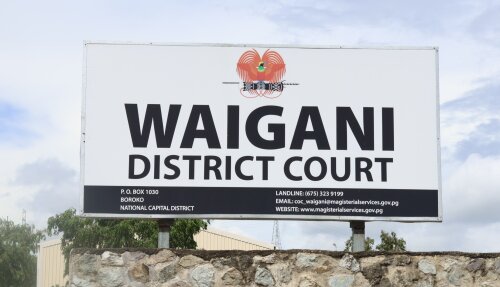Best Collaborative Law Lawyers in Papua New Guinea
Share your needs with us, get contacted by law firms.
Free. Takes 2 min.
Free Guide to Hiring a Family Lawyer
Or refine your search by selecting a city:
List of the best lawyers in Papua New Guinea
About Collaborative Law in Papua New Guinea
Collaborative Law is an emerging field in Papua New Guinea, providing an alternative method for resolving disputes without resorting to litigation. It focuses on cooperation and communication between parties to reach a settlement that is agreeable to both sides. This method is gaining popularity in Papua New Guinea as more individuals and businesses seek cost-effective and amicable solutions to legal disputes. Especially in family and commercial contexts, collaborative law offers a framework that emphasizes mutual respect and proactive problem-solving.
Why You May Need a Lawyer
Seeking legal advice in the context of Collaborative Law can be necessary for various situations. One common scenario is family disputes, including divorce or child custody arrangements, where both parties wish to avoid courtroom adversarial processes. Businesses may also require the services of collaborative lawyers when facing contractual disputes, striving for resolutions that preserve professional relationships. Furthermore, in cases where community disputes or land matters are involved, a collaborative approach can foster peaceful and constructive dialogue.
Local Laws Overview
Papua New Guinea's legal framework supports the use of collaborative dispute resolution mechanisms, aligning with global trends in legal systems. Key aspects of the local laws include the recognition of agreements reached through collaborative processes, provided they adhere to statutory requirements. The legal context also emphasizes the importance of voluntary participation and the informed consent of all parties involved. Lawyers practicing in this field must ensure that their clients understand their rights and the implications of settlements reached collaboratively.
Frequently Asked Questions
What is Collaborative Law?
Collaborative Law is a legal process that allows parties in a dispute to work collectively with their lawyers to reach a settlement without going to court.
How is Collaborative Law different from traditional litigation?
Unlike traditional litigation, which often involves adversarial approaches, Collaborative Law focuses on negotiation and cooperation to achieve mutually beneficial solutions.
Do I need a lawyer for a collaborative process?
While it is possible to engage in collaborative processes without a lawyer, having a lawyer can provide legal guidance, ensure your rights are protected, and help facilitate constructive communication.
Can all legal disputes be resolved through Collaborative Law?
Not all disputes are suitable for Collaborative Law; it best applies to situations where parties are willing to negotiate and communicate openly, such as family and some civil matters.
What happens if the collaborative process fails?
If the collaborative process fails, the parties may still resort to traditional litigation, although the aim is to avoid this through effective negotiation.
Are agreements reached through Collaborative Law legally binding?
Yes, agreements reached through Collaborative Law can be made legally binding if they meet the formal requirements and the parties enter them voluntarily.
How long does a collaborative process typically take?
The duration of a collaborative process varies depending on the complexity of the issues and the willingness of parties to reach an agreement, but it generally takes less time than court litigation.
Is Collaborative Law confidential?
Confidentiality is a cornerstone of Collaborative Law, ensuring that discussions and negotiations remain private between the parties involved.
What if one party refuses to participate in the collaborative process?
Since Collaborative Law relies on voluntary participation, it requires the willingness of both parties. If one party refuses, alternative dispute resolution methods or litigation may be considered.
Can Collaborative Law be used for commercial disputes?
Yes, Collaborative Law is increasingly used in commercial disputes where parties seek to maintain business relationships while resolving conflicts amicably.
Additional Resources
For individuals seeking more information on Collaborative Law in Papua New Guinea, consult legal firms specializing in alternative dispute resolution. Governmental bodies such as the Papua New Guinea Judicial Services and non-governmental organizations working in legal support and family services can provide valuable insights and support.
Next Steps
If you require legal assistance in Collaborative Law, begin by identifying your specific needs and circumstances. Reach out to legal professionals with experience in collaborative processes to discuss your options. Consider attending workshops or informational sessions on Collaborative Law to better understand the process before engaging in formal proceedings. Establish clear communication and discuss your expectations with your chosen legal representative to ensure a smooth and effective collaborative process.
Lawzana helps you find the best lawyers and law firms in Papua New Guinea through a curated and pre-screened list of qualified legal professionals. Our platform offers rankings and detailed profiles of attorneys and law firms, allowing you to compare based on practice areas, including Collaborative Law, experience, and client feedback.
Each profile includes a description of the firm's areas of practice, client reviews, team members and partners, year of establishment, spoken languages, office locations, contact information, social media presence, and any published articles or resources. Most firms on our platform speak English and are experienced in both local and international legal matters.
Get a quote from top-rated law firms in Papua New Guinea — quickly, securely, and without unnecessary hassle.
Disclaimer:
The information provided on this page is for general informational purposes only and does not constitute legal advice. While we strive to ensure the accuracy and relevance of the content, legal information may change over time, and interpretations of the law can vary. You should always consult with a qualified legal professional for advice specific to your situation.
We disclaim all liability for actions taken or not taken based on the content of this page. If you believe any information is incorrect or outdated, please contact us, and we will review and update it where appropriate.
Browse collaborative law law firms by city in Papua New Guinea
Refine your search by selecting a city.









